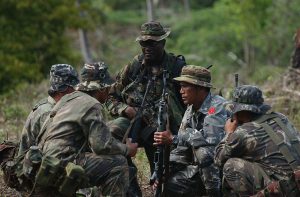More than 66,000 people in the Philippines’ southern Maguindanao province have fled their homes due to reignited conflict between the Armed Forces of the Philippines (AFP) and the Bangasmoro Islamic Freedom Fighters (BIFF), a fringe group inspired by the Islamic State (IS).
The clashes began when the AFP fired mortars at alleged BIFF areas on the morning of March 18, followed by a gunfight between AFP forces and BIFF members around a market along a provincial highway.
The BIFF, which used to be aligned with the Moro Islamic Liberation Front (MILF), broke away after the MILF signed a peace agreement in 2014 with the Philippine government. In the agreement, the MILF agreed to end decades of armed struggle in exchange for the establishment of an autonomous region.
That region, the Bangasmoro Autonomous Region of Muslim Mindanao (BARMM), was formally established in early 2019. The young BARMM government has urged militant groups to embrace peace and has attempted to smooth fissures between rival Moro factions.
But Mindanao has been continually roiled by the presence of IS-inspired groups. Most notably, the IS-inspired Maute militant group laid siege to the city of Marawi in May 2017, leading to a five-month-long conflict with the Phliippine military. Many families displaced by that conflict have yet to return home.
The leading peacebuilding group International Alert, which is monitoring the conflict, told the Philippine Inquirer this week the military and MILF must work together to disband the BIFF, especially as the first-ever BARMM elections are scheduled to be held in 2022.
Francisco Lara Jr., a senior peace and conflict adviser for International Alert, told the Inquirer the violence could lead to political turmoil before those elections, noting that some local officials are “orchestrating violent incidents” to “weaken the legitimacy and authority of the Bangasmoro transition government” with an eye on gaining electoral power in 2022.
The BARMM has reiterated that it is working with the MILF and the Philippine military to eliminate the BIFF.
There are barriers, however, keeping both the MILF and AFP from prioritizing the disbanding of the BIFF and working together to combat IS-aligned extremism. For the MILF, the fight against the BIFF is complicated by the ties between the two Moro groups, especially due to their past allegiance.
The AFP, meanwhile, has focused more publicly and more prominently on its stated goal of ending the country’s armed communist insurgency by 2022 — despite heavy criticism the AFP is using this campaign to harass, arrest and kill legal progressive activists and critics of President Rodrigo Duterte.
Rohan Gunaratna, a terrorism expert and professor of security studies at Singapore’s Nanyang Technology University, told The Diplomat last year the government was being misguided by ramping up military operations against communist rebels, who have been consistently amicable to peace talks and had been making headway until Duterte unilaterally ended negotiations in late 2017.
Mindanao was placed under martial law for nearly three years between 2017 and 2020, but this did not lessen the presence of IS-backed extremists on the island.

































